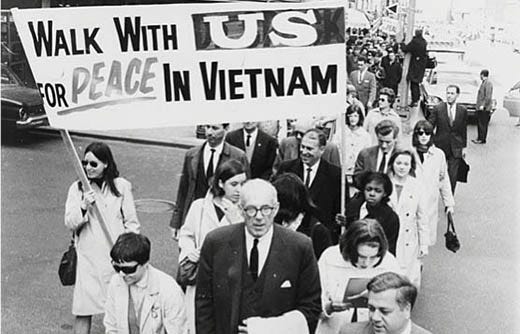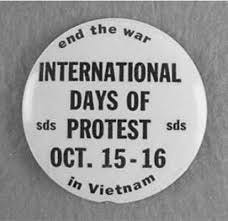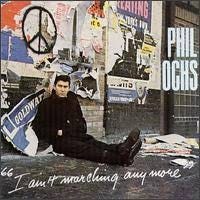On this day in 1965
The first nationwide mass protests against the Vietnam War
Sixty years ago today, the war makers met their first nationwide wall of resistance. On October 15, 1965, tens of thousands of Americans in over 40 cities took to the streets, campuses, churches, and union halls to protest a war they hadn’t voted for and no longer believed in. These demonstrations drew over 100,000 participants and included the first public draft card burnings, as well as slogans such as “Hell no, we won’t go!”
This wasn’t a single march. It was a mosaic of resistance. In New York, clergy led vigils. In Berkeley, students staged teach-ins and burned draft cards. Detroit’s protest featured participation from members of the United Auto Workers (UAW), local chapters of the NAACP, and clergy aligned with the Detroit Council of Churches. These groups had already been collaborating on civil rights campaigns — and many viewed the Vietnam War as siphoning resources from the War on Poverty, disproportionately drafting Black and working-class youth, and fueling militarism abroad while neglecting justice at home
The protests were sparked by Students for a Democratic Society (SDS), but they quickly outgrew any one group. SDS was one of the first groups to call for a nationwide day of protest. They helped coordinate actions across dozens of cities, working with local chapters, allied student groups, and sympathetic faculty to organize teach-ins, marches, and civil disobedience.
SDS framed the war not just as a foreign policy blunder, but as a symptom of deeper systemic rot — imperialism, racism, and economic exploitation. Their messaging helped shift the antiwar movement from moral pacifism to radical critique.
October 15th was a turning point. The war was no longer just a foreign policy debate. It was a moral crisis. A test of conscience. The press downplayed it. The White House dismissed it. But the movement had found its voice. And it would only grow louder, through draft resistance, mass mobilizations, and the radicalization of a generation.
* * *
Phil Ochs’ “I Ain’t Marching Anymore,” released in 1965, was a searing antiwar anthem that became a rallying cry for the burgeoning Vietnam War protest movement. Ochs, a Greenwich Village folk singer and radical journalist, fused biting satire with historical indictment, tracing America’s militarism from the Revolutionary War to Vietnam.
* * *
Today, as we prepare for Saturday’s No Kings protests, the spirit of ‘65 still lives on within many of us.





I made it there in a bus from Nebraska full of radical farmers, and a few students from Iowa. The farmers got the mike from the driver, and took turns explaining left farm history and politics to all of us youngsters. Carl Oglesby stole the day by ‘naming the system’ as corporate liberalism. They’re still on top, but displaced today by MAGA fascists. The struggle continues.
1968 feels episodic. These times are very different, especially for Black and Brown people. Gestapo-like: unmarked cars, masked men, no ID’s’ no charges, people disappearing, the tear gas, beating people, denying legislators the right to check on their constituents, clergy beaten on and on.